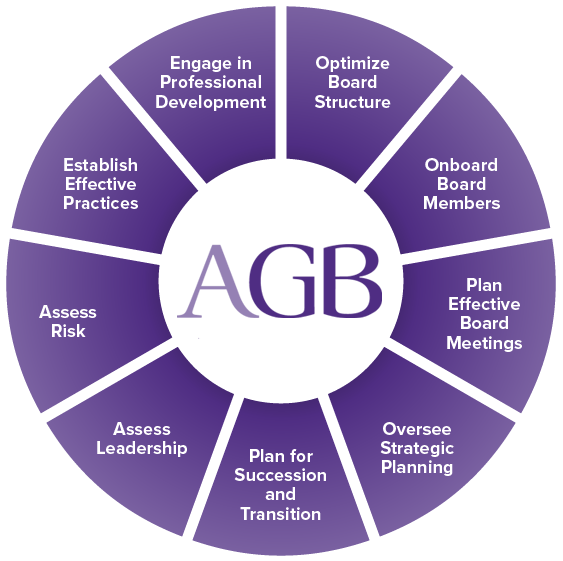Navigate your board's responsibilities.
Higher education boards engage in a number of activities as board members address their duties. AGB provides resources, education, and support to help boards fulfill these responsibilities and ensure long-term sustainability for their institutions.

Click on the links below to explore the ways AGB helps you fulfill your board responsibilities.
Optimize Board Structure
An optimized board structure is essential for accountability, transparency, effective decision-making, and the ability to adapt to evolving needs and challenges.
- Review your board’s structure, culture, and composition using a governance checklist or a one-hour governance consultation.
- Understand and apply the principles of effective board governance.
- Benchmark your board’s policies, practices, and composition.
- Align your committee structure with board priorities.
- Develop a healthy, transparent, and collaborative board culture.
Onboard Board Members
An effective onboarding program provides new board members with the necessary knowledge, context, and relationships to contribute effectively, make informed decisions, and fulfill their fiduciary duties.
- Complement your board’s orientation with AGB’s virtual self-paced governance overview.
- Learn what constitutes an effective board.
- Learn what constitutes an effective board member.
- Understand your fiduciary duties.
- Optimize your board orientation.
Plan Effective Board Meetings
Effective board meetings foster productive discussions, informed decision-making, active engagement, and an efficient use of time, ultimately leading to better governance outcomes.
- Elevate your board meetings and retreats with the help of an AGB expert.
- Optimize meetings with a board meeting management portal.
- Enhance boardroom conversations with tools and toolkits.
Oversee Strategic Planning
Governing boards must ensure strategic plans align with institutional goals, anticipate changing landscapes, promote innovation, allocate resources effectively, and drive long-term success.
- Understand the elements of strategy and planning.
- Explore higher education business models.
- Engage your board in conversations about the future of your institution or foundation.
- Plan for high-impact change with the help of an AGB expert.
Plan for Succession and Transition
Planning for succession and transition supports continuity of effective leadership, knowledge transfer, and smooth transitions, minimizing disruptions and maintaining institutional stability.
- Leverage leading practices for a presidential search.
- Identify skills, experiences, and backgrounds necessary for board success at public or independent institutions and institutionally related foundations.
- Gain an outside perspective to help you maximize leadership effectiveness.
- Attract highly qualified, diverse candidates for senior-level executive positions.
Assess Leadership
Regular assessment of boards and leaders provides a mechanism to evaluate effectiveness, identify areas for better collaboration, enhance governance practices, and ensure strategic alignment.
- Conduct a board performance survey.
- Conduct a comprehensive board assessment.
- Master leading practices for board assessment.
- Develop and assess executive leadership.
- Perform a facilitated executive assessment.
Assess Risk
Assessing risk allows for proactive identification, mitigation, and management of potential risks, ensuring institutional resilience and safeguarding long-term viability.
- Incorporate comprehensive enterprise risk management.
- Oversee a safe learning environment.
- Sharpen your focus on reputational, student experience, and compliance risks.
- Enhance your ability to oversee cyber risk.
- Learn about top strategic issues facing your board.
Establish Effective Practices
Higher education boards oversee many duties unique to their sector, requiring special attention to effective board practices.
- Learn what constitutes an effective board.
- Support effective board membership.
- Demonstrate a commitment to shared governance.
- Prepare for your board’s role in accreditation.
- Foster a safe learning environment.
- Empower your board to focus on student success.
Engage in Professional Development
Staying abreast of industry trends, leading practices, and emerging challenges enables boards and leaders to make informed, forward-focused decisions.
- Stay ahead of trends, issues, and leading practices with Trusteeship magazine.
- Meet and hear from the world’s foremost governance experts at AGB events.
- Invite an AGB topical expert to facilitate your board workshop or retreat.
- Understand the latest policy developments affecting board governance.
- Enhance your impact as a board liaison with AGB’s Board Professional Certificate ProgramTM.
- Refresh your knowledge with AGB’s virtual self-paced governance overview.

